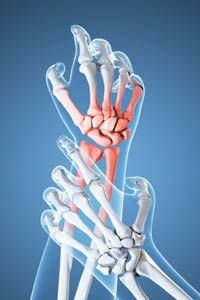
Your grandma may have sworn herarthritiswas due to that storm a-brewing. Or perhaps you think your aching back is the fault of the coldweatheryou've been experiencing lately. But is this true?
Scientists have attempted to study this over the years and got conflicting results. A2019 British studythat ran 15 months (andwas the largest of its kind) recruited 13,000 U.K. residents living with chronic pain, who used an app to record their pain level. Their GPS location was linked to weather data. Analyzing the data, the researchers found that days with higher humidity, lower pressure, and stronger winds are more likely associated with high pain days. (The participants were asked whether they believed there was a connection between weather and pain but found that belief did not affect the results,according to the study, which was published in Nature.)
Advertisement
"The analysis showed that on a damp and windy days with low pressure the chances of experiencing more pain, compared to an average day, was around 20 percent. This would mean that, if your chances of a painful day on an average weather day were 5 in 100, they would increase to 6 in 100 on a damp and windy day," said lead study author Will Dixon, professor of digital epidemiology at the University of Manchesterin a press release.
On the other hand, in 2014,Australian researchersfound that there was absolutely no relationship between body aches and the weather. When social media basically called them liars and hooligans, they replicated the findings in a pair of 2017 studies. Scientists from the George Institute for Global Health in Australia surveyed nearly1,000 people dealing with lower back painand350 diagnosed with knee osteoarthritis. Weather details from the date of pain onset, as well as a month and a week before the pain appeared, were all compared.
The studies showed zero relationship between those physical ailments and weather conditions like humidity, air pressure, temperature, precipitation or wind direction, reinforcing the results of the institute's 2014 study. According to professor Chris Maher, lead study author, people were simply more likely to remember events that were in line with their pre-existing beliefs. "Human beings are very susceptible so it's easy to see why we might only take note of pain on the days when it's cold and rainy outside, but discount the days when they have symptoms but the weather is mild and sunny," he explained in apress release.
While the scientists continue to debate this, many people living with joint pain swear that there is a connection. Changes in气压, rather than the barometric pressure itself, may be to blame. When the pressure is decreasing (a precusor to bad weather), there is less air pressure on our bodies which allows tissues to swell slightly, which may irritate joints,says the Cleveland Clinic. Or it might be that on cold or rainy days, people do less activity and joint pain is often improved by exercise. "If you combine results of the various studies, the general consensus is that cold, wet weather is the worst for inciting arthritis pain," saysthe American Arthritis Foundation in a blog post.
But we surely haven't heard the last of this debate.
Advertisement



